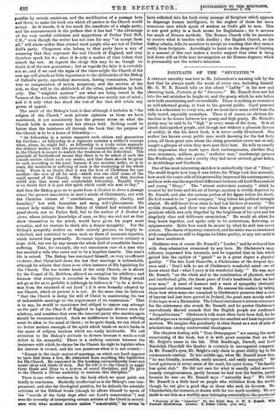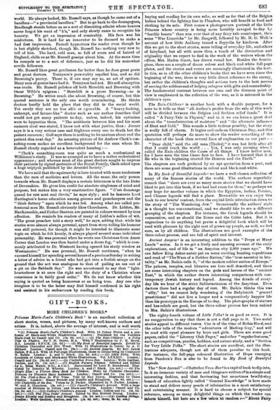PORTRAITS OF THE " SEVENTIES."'"
A CERTAIN unreality was lent to Mr. Labouchere's amusing talk by the fact that he always made the worat of every one, including himself. Mr. G. W. E. Russell tells us this about " Labby " in his new and charming book, Portraits of the " Seventies." Mr. Russell does not fall into the sad mistakes he laughs at, and the gossip which ho sets before us is both entertaining and vraisemblable. There is nothing so recreative as well-informed gossip, at least to the general public. Good personal talk is a relaxation to every one, and wo must have some relief from the daily round, especially nowadays. There is of course an obvious dis- tinction to be drawn between low gossip and high gossip. Mr. Russelr3 gossip may be said to be "high " in every sense of the term. It is all about distinguished people, and though not without a pleasant flavour of acidity, in this his latest book, it is never really ill-natured. Our author has known every public man worth knowing for the last forty years, all those great men whom the rising generation never saw or only caught a glimpse of when they were past their best. He tells us exactly what impression they made upon their contemporaries, whether they were statesmen, soldiers, poets, " medicine men," nondescript persons like Bradlaugh, who rent a society they had never entered, great ladies, or Archbishops and Cardinals.
One of his most interesting sketches is undoubtedly that of " Dizzy." The world forgets how long it was before the Whigs took him seriously, how much the comic side of his personality impressed his contemporaries, and how wide, was the superficial difference between old Lord Beaconsfield and young " Dizzy." The " almost malevolent curiosity " which he crested by his looks and his air of foreign mystery is vividly depicted by Mr. Russell, and also the curious pathos of his figure before his death. He had ceased to be " good company " long before his political strength abated. He still loved dress when he had lest his love of society. " His eyelids drooped, and there was about him a general air of incipient paralysis which was only dispelled by the brightness of his eyes and his singularly clear and deliberate enunciation." He would sit silent for long hours together, and spoke only to be sententious, flattering, or epigrammatic. Quite how much he meant by what he said was never certain. The charm of mystery remained, and his satire was so sweetened with compliment as still to disguise its bitter quality, at any rate until it had been swallowed.
Gladstone was of course Mr. Russell's " Leader," and he writes of him with deep admiration unwarmed by any love. Mr. Gladstone's mag- nificence impressed him intensely, and he regarded that in him which gained him the epithet of " grand " as in a great degree a physical quality. " The late Lord Granville, a Gladstonian of the deepest dye, once said Don't talk to me of Gladstone's wonderful mind—we all know about that—what I envy is his wonderful body.' " He was, says Mr. Russell, "on the whole and in the combination of physical, moral and intellectual gifts, the finest piece of God's handiwork that we had ever seen." A want of humour and a want of sympathy obviously impressed our informant very much. He amuses his readers by telling them how when some one remarked in Gladstone's presence that a case of leprosy had just been proved in Ireland, the great man merely asked if the leper were a Nationalist. The Liberal statesman's intense reverence for the aristocracy also struck Mr. Russell, and he quotes Gladstone's marvellously shrewd remark that the English people are confirmed " Inequalitariana." Gladstone's talk must often have been dull, for he would argue as a mental gymnastic upon the smallest and least important matters. We imagine this peculiarity is often found as a sort of relic of scholasticism among controversial theologians.
The chapters dealing with " Four Demagogues " are among the most entertaining of the book, but it is with great surprise that we find Mr. Bright's name in the list. With Bradlaugh, Parnell, and Lord Randolph Churchill the Quaker is certainly in uncongenial company. In Mr. Russell's eyes, Mr. Bright's only claim to great ability lay in his consummate oratory. In /ate middle ago, when Mr. Russell knew him, " he was friendly, accessible, easily amused, and easily annoyed." He loved quietness in every sane of the word, his quiet home, " his hardly less quiet club." He did not care for what is usually called success, namely conspicuousness, partly because he had won his battles, partly because he was—so Mr. Russell says—" naturally lazy." We think Mr. Russell is a little hard on people who withdraw from the world, though he can give a good slap at those who seek its favours. Mr. Chamberlain, for instance, is drawn with far too much acerbity. We are made to see him as a worldly man belonging essentially to the provincial • Portraits of the " Sevrotera." Br the Hight Hon. G. W. E. Russell. weat Portrait lausteatems. London: T. !blur Unwht. tH,s. net.] world. He always looked, Mr. Russell says, as though he came out of a bandbox—" a provincial bandbox." But to go back to the demagogues, Bra-dlaugh stands before ns as a sort of dissenting atheist whose hearers never forgot his want of "h's," and only slowly came to recognize hie honesty- We got an impression of comicality. His face was his misfortune. It is hard for an innovator to be doomed to make a had first impression. Parnell hypnotizes the reader even though he is but slightly sketched, though Mr. Russell has nothing very new to tell of him. The hard, cold man, so full of scorn and of hatred of England, chills us as Mr. Russell gossips about him. At the same time he compels us to a sort of deference, just as he did his somewhat servile followers.
Mr. Russell likes great gentlemen far better than ho does great poets and great doctors. Tennyson's personality repelled him, and so did Browning's poetry. There is, if one may say so, an art of egotism. Many men of genius have had it. Tennyson had not. His self-absorption was credo. Mr. Russell polishes off both Meredith and Browning with Oscar Wilde's epigram : " Meredith is a prose Browning—so is Browning." He writes much else about Browning, of course, but this quoted sentence is the only one worth remembering. He thinks doctors hardly hold the place that they did in the social world. Yet surely they are no less ab'e or egreeahle. A " heavy-looking, unkempt, and farmer-like " doctor such as our author describes Gull would not get many patients to-day, unless, indeed, his optimism were to hypnotize them. "The antithesis between him and his most eminent rival was stated, I know not with what justice, thus : Jenner says it is a very serious case and frightens every one to death but the patient recovers ; Gull says there is nothing to be anxious about and the patient dies next day." An amusing picture of Sir Andrew Clark's con- sulting-room makes an excellent background for the man whom Mr. Russell clearly regarded as a benevolent humbug :- "Clark's consulting-room was quite as much a confessional as Wilkinson's study. It was so arranged as to have a rather ecclesiastical appearance ; and whereas most of the great doctors sought to impress their patients by signed portraits of the Royal Family, Clark relied upon a huge triptych published by the Arandel Society."
We have said that the squirearchy is here treated with more tenderness than the men of medicine and letters. All the same, the only person towards whom Mr. Russell displays a certain bitterness is the late Duke of Devonshire. Ho gives him credit for absolute singleness of mind and purpose, but makes him a very unattractive figure. " Crest dommago quand les roil sent mal eleves," he says slyly ; and he laments Lord Hartington's home education among grooms and gamekeepers and the " thick flattery " upon which he was fed. Among what are called pro- fessional men Mr. Russell obviously likes Churchmen. Dr. Liddon, Mr. MacKonochie, and Father Stanton are painted in colours warmed by true affection. He reminds his readers of many of Liddon's sallies of wit. "The great preacher told a story well," he says, adding that, while his stories were almost always personal, apart from story-tolling his humour was still personal, for though it might be intended to illustrate some topic on which ho folt keenly, it always played around some individual personality. He was personal when he wrote one Christmas from Amen Corner that London was then buried under a dense fog, " which is com- monly attributed to Dr. Weateott having opened his study window at Westminster." He was personal, Mr. Russell continues, "when he excused himself for spending several hours of a precious Sunday in writing a letter of advice to a friend who had got into a foolish scrape on the ground that the ace was analogous to that of pulling an ass out of a pit on the Sabbath day." He was accustomed to say that " light- heartedness is at once the right and the duty of a Christian whose conscience is in fairly good order." We do not know whether this saying is quoted as being humorous or as being true. Any one who imagines it to be the latter may find himself confirmed in his right and assisted in his endeavours by reading this book.













































 Previous page
Previous page